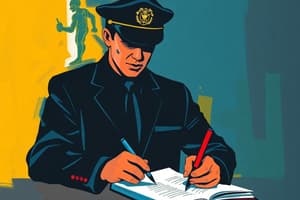Podcast
Questions and Answers
What is a crucial strategy to use when handling difficult interviewees?
What is a crucial strategy to use when handling difficult interviewees?
- Keep your composure and ask direct questions (correct)
- Encourage them to express their emotions openly
- Change the subject to lighten the mood
- Allow them to take breaks frequently
When interviewing victims, especially those of sexual offenses, what approach is strongly recommended?
When interviewing victims, especially those of sexual offenses, what approach is strongly recommended?
- Focus solely on legal terminology in questioning
- Trauma-informed approach with empathy and reassurance (correct)
- Aggressive interrogation to obtain accurate facts
- Use of humor to ease the victim's anxiety
What should be your first step when initiating an interview with an interviewee?
What should be your first step when initiating an interview with an interviewee?
- Ask direct questions immediately
- Explain the legal implications of their story
- Jump to questioning about their response to the event
- Have them reflect on the physical surroundings and feelings (correct)
What is a common challenge victims may face during an interview after experiencing trauma?
What is a common challenge victims may face during an interview after experiencing trauma?
How can you effectively regain focus if an interviewee goes off-topic?
How can you effectively regain focus if an interviewee goes off-topic?
What is an important aspect to remember regarding how victims may respond during an interview?
What is an important aspect to remember regarding how victims may respond during an interview?
What should you do if information is missing after completing an interview?
What should you do if information is missing after completing an interview?
What is an effective method of establishing rapport with victims during an interview?
What is an effective method of establishing rapport with victims during an interview?
What is the primary reason for using Standard English in reports?
What is the primary reason for using Standard English in reports?
Which of the following is an acceptable use of slang in reports?
Which of the following is an acceptable use of slang in reports?
Why might it be acceptable to use textspeak in note-taking?
Why might it be acceptable to use textspeak in note-taking?
What should be done if acronyms are used in a report?
What should be done if acronyms are used in a report?
According to proper legibility practices, which writing method is encouraged for reports?
According to proper legibility practices, which writing method is encouraged for reports?
What impact does using unprofessional language, such as textspeak, have on a report?
What impact does using unprofessional language, such as textspeak, have on a report?
What is the recommended pen color for handwriting reports?
What is the recommended pen color for handwriting reports?
What is a characteristic of writing in active voice?
What is a characteristic of writing in active voice?
Why is past tense commonly used in law enforcement reports?
Why is past tense commonly used in law enforcement reports?
What must you do to avoid misrepresentations in your writing?
What must you do to avoid misrepresentations in your writing?
What is an example of a corrective action to take regarding spelling mistakes?
What is an example of a corrective action to take regarding spelling mistakes?
Which capitalization rule is NOT mentioned as a guideline?
Which capitalization rule is NOT mentioned as a guideline?
What should you do if you are uncertain about the spelling of a word?
What should you do if you are uncertain about the spelling of a word?
Why is it important to maintain consistent verb tense in reports?
Why is it important to maintain consistent verb tense in reports?
What is a potential consequence of using incorrect grammar in a report?
What is a potential consequence of using incorrect grammar in a report?
What indicates the use of passive voice in a sentence?
What indicates the use of passive voice in a sentence?
In the example 'The thief took there money', what is the error?
In the example 'The thief took there money', what is the error?
What is the primary purpose of a well-written report in law enforcement?
What is the primary purpose of a well-written report in law enforcement?
Which statement best describes the limits regarding juvenile interrogations in North Carolina?
Which statement best describes the limits regarding juvenile interrogations in North Carolina?
What does the phrase 'If it isn’t in the report, it didn’t happen' imply?
What does the phrase 'If it isn’t in the report, it didn’t happen' imply?
What factor is NOT typically documented during juvenile interrogations?
What factor is NOT typically documented during juvenile interrogations?
Why is it critical to maintain reports long after a case is over?
Why is it critical to maintain reports long after a case is over?
What may influence how long reports should be retained?
What may influence how long reports should be retained?
Which of the following best illustrates the importance of writing clear reports?
Which of the following best illustrates the importance of writing clear reports?
What is one consequence of a poorly written report?
What is one consequence of a poorly written report?
What must be documented if a child experiences a delay before their interrogation?
What must be documented if a child experiences a delay before their interrogation?
Which of the following is a key component that supports the legal process concerning a report?
Which of the following is a key component that supports the legal process concerning a report?
What must a law enforcement officer do before conducting an interrogation as per the Miranda decision?
What must a law enforcement officer do before conducting an interrogation as per the Miranda decision?
Which of the following factors must be considered to determine if a person is in custody?
Which of the following factors must be considered to determine if a person is in custody?
What happens if law enforcement fails to provide Miranda warnings during an interrogation?
What happens if law enforcement fails to provide Miranda warnings during an interrogation?
The concept of custody, as defined in the Miranda decision, refers to which of the following?
The concept of custody, as defined in the Miranda decision, refers to which of the following?
In addition to custody, which of the following elements is essential for the Miranda requirements?
In addition to custody, which of the following elements is essential for the Miranda requirements?
According to the Miranda decision, what is required for a suspect to waive their rights?
According to the Miranda decision, what is required for a suspect to waive their rights?
Which statement best describes the interaction during a Terry stop with regard to Miranda warnings?
Which statement best describes the interaction during a Terry stop with regard to Miranda warnings?
What does the term 'interrogation' imply in relation to the Miranda decision?
What does the term 'interrogation' imply in relation to the Miranda decision?
In determining whether a reasonable person would believe they were free to leave, which aspect is critical?
In determining whether a reasonable person would believe they were free to leave, which aspect is critical?
What pivotal role did the Miranda v. Arizona decision play in law enforcement practices?
What pivotal role did the Miranda v. Arizona decision play in law enforcement practices?
Flashcards
Interviewing Strategies
Interviewing Strategies
Methods for gathering information from interviewees, including how to handle different types of interviewees and manage their reactions.
Trauma-Informed Approach
Trauma-Informed Approach
A method of interviewing victims focusing on empathy, reassurance, and non-judgment, considering the impact of trauma on memory and perception.
Difficult Interviewees
Difficult Interviewees
Interviewees who may exhibit challenging behaviors or have responses that are difficult to manage. Strategies for handling difficult interviewees include keeping composure, asking direct questions, and managing stress/anxiety.
Follow-up Questions
Follow-up Questions
Signup and view all the flashcards
Victim Interviewing
Victim Interviewing
Signup and view all the flashcards
Observe Interviewee Behavior
Observe Interviewee Behavior
Signup and view all the flashcards
Five Senses for Interviewing
Five Senses for Interviewing
Signup and view all the flashcards
KWWHW Approach
KWWHW Approach
Signup and view all the flashcards
Miranda Decision
Miranda Decision
Signup and view all the flashcards
Custody
Custody
Signup and view all the flashcards
Interrogation
Interrogation
Signup and view all the flashcards
Fifth Amendment
Fifth Amendment
Signup and view all the flashcards
Sixth Amendment
Sixth Amendment
Signup and view all the flashcards
Terry Stop
Terry Stop
Signup and view all the flashcards
Traffic Stop
Traffic Stop
Signup and view all the flashcards
Roadside DUI Test
Roadside DUI Test
Signup and view all the flashcards
Reasonable Person Standard
Reasonable Person Standard
Signup and view all the flashcards
Miranda Warnings
Miranda Warnings
Signup and view all the flashcards
Juvenile Interrogation Time Limit
Juvenile Interrogation Time Limit
Signup and view all the flashcards
Delay Documentation
Delay Documentation
Signup and view all the flashcards
Break/Rest Periods
Break/Rest Periods
Signup and view all the flashcards
Interview Limit
Interview Limit
Signup and view all the flashcards
Report Importance
Report Importance
Signup and view all the flashcards
Report Purpose (Benefit 1)
Report Purpose (Benefit 1)
Signup and view all the flashcards
Report Purpose (Benefit 2)
Report Purpose (Benefit 2)
Signup and view all the flashcards
Report Purpose (Benefit 3)
Report Purpose (Benefit 3)
Signup and view all the flashcards
Report Accuracy
Report Accuracy
Signup and view all the flashcards
Report Longevity
Report Longevity
Signup and view all the flashcards
Standard English
Standard English
Signup and view all the flashcards
Jargon
Jargon
Signup and view all the flashcards
Slang
Slang
Signup and view all the flashcards
Textspeak
Textspeak
Signup and view all the flashcards
Legibility
Legibility
Signup and view all the flashcards
Report Writing Best Practices
Report Writing Best Practices
Signup and view all the flashcards
Quoting Witnesses
Quoting Witnesses
Signup and view all the flashcards
Active Voice
Active Voice
Signup and view all the flashcards
Passive Voice
Passive Voice
Signup and view all the flashcards
Past Tense in Reports
Past Tense in Reports
Signup and view all the flashcards
Consistency in Tense
Consistency in Tense
Signup and view all the flashcards
Spellcheck Limitations
Spellcheck Limitations
Signup and view all the flashcards
Capitalization Rules
Capitalization Rules
Signup and view all the flashcards
Proper Capitalization Example
Proper Capitalization Example
Signup and view all the flashcards
Why Correct Grammar Matters
Why Correct Grammar Matters
Signup and view all the flashcards
Impact of Incorrect Grammar
Impact of Incorrect Grammar
Signup and view all the flashcards
Using Dictionaries
Using Dictionaries
Signup and view all the flashcards
Study Notes
Unit 1: Basics of Interviewing - Lesson 1: Taking Good Notes
- Note-taking is crucial for accurate incident, event, activity, or statement documentation.
- Accurate notes aid in report completion, depositions, and future officer involvement in the incident.
- Notes should include "where," "when," "who," "what," "how," and "why" details.
What to Record in Notes
- Gather information from complainants, witnesses, victims, and other involved parties.
- Record details about the event, interviews, and persons involved.
- Notes should answer the fundamental questions of "where," "when," "who," "what," "how," and "why."
Unit 1: Basics of Interviewing - Lesson 2: Preparing for the Interview
- Interviews involve gathering information from victims, witnesses, and suspects.
- Officers are responsible for conducting thorough interviews.
- Documentation is crucial for accuracy in case proceedings.
- Safety is paramount; interviewees may possess weapons.
- Pre-interview planning includes determining whom to interview and in what order.
Unit 1: Basics of Interviewing - Lesson 3: Conducting the Interview
- Interviews have three stages: warm-up, primary, and closing.
- The warm-up stage focuses on rapport and comfort.
- The primary stage gathers information about the incident. Use open-ended and closed-ended questions.
- Summarize the information and appreciate the interviewee in the final/closing stage.
- There are limitations to the interviewing process.
Unit 1: Basics of Interviewing - Lesson 4: Miranda and Laws of Interrogation
- Interrogations are different from interviews.
- Interrogations are formal and the suspect is in custody.
- Officers must follow Miranda rights, which include the right to remain silent, an attorney, and the understanding of rights. Custodial interrogation requires Miranda warnings.
Unit 2: Writing a Report - Lesson 1: Reports
- A well-written report is crucial for legal proceedings and agency efficiency.
- A report documents factual information about incidents.
- Reports are used in many legal proceedings. Factors include appeals, criminal filings, criminal trials, civil proceedings, depositions, and internal investigations.
Unit 2: Writing a Report - Lesson 2: Mechanics
- Proper English, grammar and punctuation increase the clarity and accuracy of reports.
- Active voice and proper tense usage enhance report quality.
- Spelling and capitalization are critical for accuracy and credibility.
- Vocabulary increases report strength and effectiveness.
Unit 2: Writing a Report - Lesson 3: Elements and Principles of Effective Report Writing
- Reports need an introduction, body, and conclusion to be well-organized.
- Well-organized information is facilitated by using clear language.
- Reports should contain specific details to establish facts.
- Reports must detail who, what, when, where, why, how, and actions taken during the incident.
Unit 2: Writing a Report - Lesson 4: Reviewing a Report Before Submission
- Review reports for factuality, clarity, accuracy, and completeness.
- Make sure the content is accurate and factual.
- Double-check spelling, grammar, and punctuation.
- Assess the overall quality of the report to ensure it contains all the necessary details.
Studying That Suits You
Use AI to generate personalized quizzes and flashcards to suit your learning preferences.




